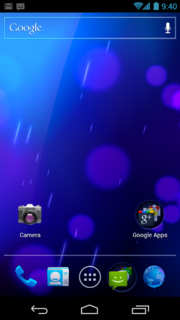Related Research Articles
Mobile app development is the act or process by which a mobile app is developed for mobile devices, such as personal digital assistants, enterprise digital assistants or mobile phones. These applications can be pre-installed on phones during manufacturing platforms, or delivered as web applications using server-side or client-side processing to provide an "application-like" experience within a Web browser. Application software developers also must consider a long array of screen sizes, hardware specifications, and configurations because of intense competition in mobile software and changes within each of the platforms. Mobile app development has been steadily growing, in revenues and jobs created. A 2013 analyst report estimates there are 529,000 direct app economy jobs within the EU then 28 members, 60 percent of which are mobile app developers.
A mobile operating system is an operating system for mobile phones, tablets, smartwatches, 2-in-1 PCs, smart speakers, or other mobile devices. While computers such as typical laptops are 'mobile', the operating systems used on them are generally not considered mobile ones, as they were originally designed for desktop computers that historically did not have or need specific mobile features. This distinction is becoming blurred in some newer operating systems that are hybrids made for both uses.

Moblin, short for 'mobile Linux', is a discontinued open source operating system and application stack for Mobile Internet Devices (MIDs), netbooks, nettops and embedded devices.

Chrome OS is a Gentoo Linux-based operating system designed by Google. It is derived from the free software Chromium OS and uses the Google Chrome web browser as its principal user interface. Unlike Chromium OS, Chrome OS is proprietary software.
Pre-installed software is software already installed and licensed on a computer or smartphone bought from an original equipment manufacturer (OEM). The operating system is usually pre-installed, but because it is a general requirement, this term is used for additional software apart from the bare necessary amount, usually from other sources.

MeeGo is a discontinued Linux distribution hosted by the Linux Foundation, using source code from the operating systems Moblin and Maemo. Primarily targeted at mobile devices and information appliances in the consumer electronics market, MeeGo was designed to act as an operating system for hardware platforms such as netbooks, entry-level desktops, nettops, tablet computers, mobile computing and communications devices, in-vehicle infotainment devices, SmartTV / ConnectedTV, IPTV-boxes, smart phones, and other embedded systems.

The Nokia N9 is a smartphone developed by Nokia, running on the Linux-based MeeGo mobile operating system. Announced in June 2011 and released in September, it was the first and only device from Nokia with MeeGo, partly because of the company's partnership with Microsoft announced that year. It was initially released in three colors: black, cyan and magenta, before a white version was announced at Nokia World 2011.
A mobile application, also referred to as a mobile app or simply an app, is a computer program or software application designed to run on a mobile device such as a phone, tablet, or watch. Apps were originally intended for productivity assistance such as email, calendar, and contact databases, but the public demand for apps caused rapid expansion into other areas such as mobile games, factory automation, GPS and location-based services, order-tracking, and ticket purchases, so that there are now millions of apps available. Apps are generally downloaded from application distribution platforms which are operated by the owner of the mobile operating system, such as the App Store (iOS) or Google Play Store. Some apps are free, and others have a price, with the profit being split between the application's creator and the distribution platform. Mobile applications often stand in contrast to desktop applications which are designed to run on desktop computers, and web applications which run in mobile web browsers rather than directly on the mobile device.

Android Ice Cream Sandwich is the fourth major version of the Android mobile operating system developed by Google. Unveiled on October 19, 2011, Android 4.0 builds upon the significant changes made by the tablet-only release Android Honeycomb, in an effort to create a unified platform for both smartphones and tablets.

Mer was a free and open-source software distribution, targeted at hardware vendors to serve as a middleware for Linux kernel-based mobile-oriented operating systems. It is a fork of MeeGo.
Mobile application testing is a process by which application software developed for handheld mobile devices is tested for its functionality, usability and consistency. Mobile application testing can be an automated or manual type of testing. Mobile applications either come pre-installed or can be installed from mobile software distribution platforms. Global mobile app revenues totaled 69.7 billion USD in 2015, and are predicted to account for US$188.9 billion by 2020.

Jolla Oy is a Finnish technology company; vendor and developer of Sailfish OS. Headquartered in Tampere, Finland, Jolla has its own research and development offices in Helsinki, Tampere and Cyberport, Hong Kong. Jolla was founded in 2011 by former Nokia staff of the MeeGo project team to use the MeeGo opportunities and its "endless possibilities".

Sailfish OS is a Linux-based operating system based on free software, and open source projects such as Mer as well as including a closed source UI. The project is being developed by the Finnish company Jolla.
Microsoft mobile services are a set of proprietary mobile services created specifically for mobile devices, they are typically offered through mobile applications and mobile browser for Windows Phone, | platforms, BREW, and Java. Microsoft's mobile services are typically connected with a Microsoft account and often come preinstalled on Microsoft's own mobile operating systems while they are offered via various means for other platforms. Microsoft started to develop for mobile computing platforms with the launch of Windows CE in 1996 and later added Microsoft's Pocket Office suite to their Handheld PC line of PDAs in April 2000. From December 2014 to June 2015, Microsoft made a number of corporate acquisitions, buying several of the top applications listed in Google Play and the App Store including Acompli, Sunrise Calendar, Datazen, Wunderlist, Echo Notification Lockscreen, and MileIQ.

Ubuntu Touch is a mobile version of the Ubuntu operating system, being developed by the UBports community. Its user interface is written in Qt, and is designed primarily for touchscreen mobile devices such as smartphones and tablet computers, but the original goal of convergence was intended to bring Ubuntu Touch to laptops, desktops, IOT devices, TVs and smart watches for a complete unified user experience.

Resilio Sync by Resilio, Inc. is a proprietary peer-to-peer file synchronization tool available for Windows, Mac, Linux, Android, iOS, Windows Phone, Amazon Kindle Fire and BSD. It can sync files between devices on a local network, or between remote devices over the Internet via a modified version of the BitTorrent protocol.
Windows App Studio, formerly Windows Phone App Studio is a discontinued web app provided by Microsoft for Windows app development. It allowed users to create apps that could be installed or published to the Microsoft Store, and in addition provided the full source code in the form of a Visual Studio 'solution'. The tool was used to develop Universal Windows Platform apps.
TestFlight is an online service for over-the-air installation and testing of mobile applications, currently owned by Apple Inc and only offered to developers within the iOS Developer Program. Developers sign up with the service to distribute applications to internal or external beta testers, who can subsequently send feedback about the application to developers. The TestFlight SDK additionally allows developers to receive remote logs, crash reports and tester feedback.

Android Nougat is the seventh major version and 14th original version of the Android operating system. First released as an alpha test version on March 9, 2016, it was officially released on August 22, 2016, with Nexus devices being the first to receive the update. The LG V20 was the first smartphone released with Nougat.
Jolla C is a limited-edition mobile phone by Jolla geared toward Community and Developers with Sailfish OS and no third-party applications installed by factory, so called "purest Sailfish OS". It is the first dual SIM device from Jolla, whose hardware specification is nearly identical to Aqua Fish released later on by Intex Technologies, only with different cellular bands set. It is compatible with Android apps.
References
- ↑ "Experience Sailfish OS on your Android Phone with Jolla Launcher now available!". The Jolla Blog. Jolla. Archived from the original on 27 June 2014. Retrieved 27 June 2014.